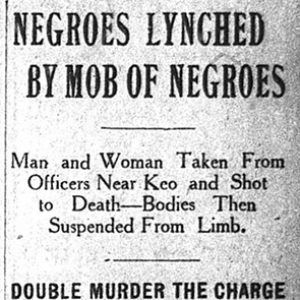calsfoundation@cals.org
Lonoke County Lynching of 1910
On April 4, 1910, Frank Pride and Laura Mitchell were lynched near Keo (Lonoke County) for allegedly murdering Pride’s wife and Mitchell’s husband, Wiley. The lynch mob was composed entirely of African Americans, one of a number of such lynchings in Arkansas. According to historian Karlos Hill, such lynchings were the result of African Americans’ lack of faith in the white judicial system. The lynchings often occurred in close-knit plantation societies and were an attempt to enforce community morals. Most, as in this case, occurred in domestic situations.
There is almost no information available on Frank Pride or Laura and Wiley Mitchell. Newspaper accounts indicate that Pride was fifty years old, and Laura Mitchell ten years younger. Frank Pride was working on the Daughtry plantation, and Wiley Mitchell worked on the Eagle farm, three miles north of England (Lonoke County). When Wiley Mitchell disappeared from R. E. L. Eagle’s farm on December 24, 1909, there was little concern. According to the Arkansas Gazette, “The community is full of negroes, many of them working at the convict camp nearby, and the disappearance of one negro excited little comment.” There was concern, however, when Frank Pride’s wife disappeared about a week later. Authorities investigated, and when Pride said that his wife was visiting relatives in Conway (Faulkner County), the matter was dropped. In early January, Pride left the Daughtry plantation to work at Robert Hood’s farm, some six miles away. Laura Mitchell accompanied him, and they set up housekeeping.
Some of Mrs. Pride’s friends, however, contacted friends in Conway and discovered that the supposed relatives were deceased. On April 3, some of the Black workers on the Eagle farm went to Eagle and asked him to help them search the Daughtry plantation for Wiley Mitchell’s body. He accompanied them, and they found a mound in the garden near where Pride had been living. They found Mitchell’s body buried there, and in the nearby woods, they found a bloodstained club which they believed had been used to bash in his head. Eagle reported their findings to the constable in Keo, and they went to the Hood farm, where they found Frank Pride and Laura Mitchell. On April 4, the two were arraigned before the justice of the peace, J. Porter Cox. After telling conflicting stories, they were held without bail pending the action of the grand jury.
Following the verdict, some angry African Americans in the courtroom quickly formed a mob outside. Cox told Constable Mallory (first name unknown) to take Pride and Mitchell out a back door and get them to Lonoke (Lonoke County) for safety. The three left Keo in a wagon, taking a circuitous route to avoid detection. Shortly before 6:00 p.m., a severe storm forced them to stop at Bert Simm’s farm. Mallory was taking the prisoners, who were shackled together, to a shanty on the Simm place when the mob surrounded them. Members of the mob, who were armed with shotguns, overpowered Mallory, tore apart the shackles, and took the prisoners to a spot about 100 yards away. According to the Gazette, the two were “killed almost before they had time to make an outcry. They were shot with a dozen shotguns. Their bodies were strung up, side by side, and left hanging until late this morning [April 5], none of the negroes on the place daring to touch them.” By the time Mallory found a lantern and arrived at the scene, the mob had dispersed.
The Lonoke County sheriff could find no clues about the members of the mob, and the coroner’s jury reached a verdict that the two victims had died of “gunshot wounds inflicted by unknown parties.” The sheriff promised that he would investigate to try to discover the identities of those in the mob, and would further search the Daughtry farm in hopes of finding Mrs. Pride’s body.
Several newspapers indicated that this was the first lynching of Blacks in Arkansas by a totally African-American mob. Historian Karlos Hill’s research, however, reveals that Black lynch mobs dated back to at least 1889, when Dan Reynolds was beaten to death by nine Black men near Coffee Creek (Phillips County).
For additional information:
Hill, Karlos. “Resisting Lynching: Black Grassroots Responses to Lynching in the Mississippi and Arkansas Deltas, 1882–1938.” PhD diss., University of Illinois at Urbana-Champaign, 2009. Online at https://www.ideals.illinois.edu/items/14633 (accessed December 23, 2025).
“A Negro Mob Lynches Negroes.” Daily Ardmoreite (Ardmore, Oklahoma), April 7, 1910, p. 2.
“Negroes Lynched by Mob of Negroes.” Arkansas Gazette, April 6, 1910, pp. 1–2.
Nancy Snell Griffith
Clinton, South Carolina







Comments
No comments on this entry yet.